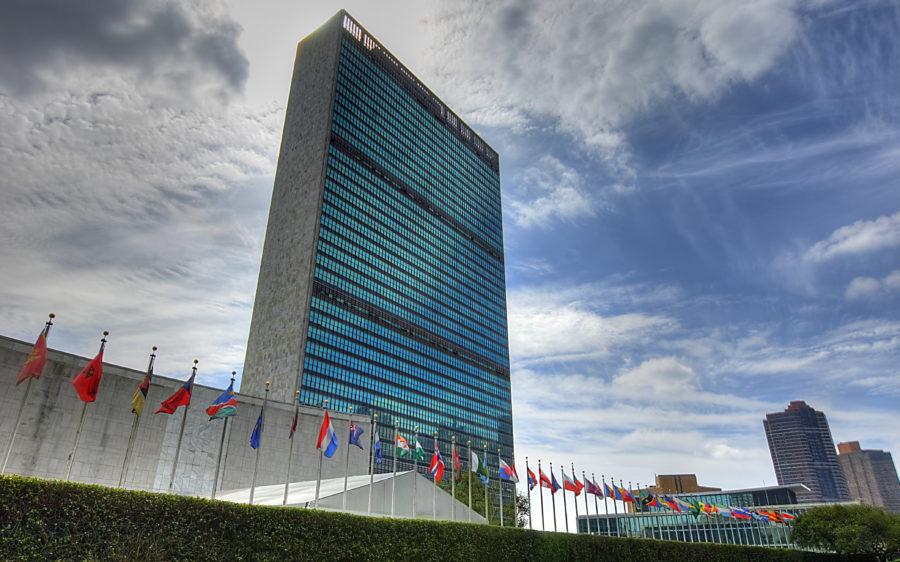Established after World War II, the United Nations undertook the responsibility of maintaining international peace and security, as well as cultivating friendly relations among nations. Jan. 10 marks the 70th anniversary of the first General Assembly meeting. Of the six organs of the United Nations, the General Assembly stands as the primary decision-making and representative organ.
“The United Nations was created in order to establish a unified body that would ensure peace, the idea is that the United Nations is there to protect and to create opportunities where we don’t have another Hitler who takes over. It also ensures that countries and their borders are safe as well as the people within the countries,” Sandy Gardner, Social Studies teacher and Model U.N. sponsor, said.
Since the ratification of the Charter of the United Nations and the Statue of the International Court of Justice in 1945, the UN has grown from including 51 to 193 nations.
According to Quinn Gordon, Co-President of Model U.N. and senior, said, “It was created after the second World War in 1945, and from then, the overall image of it has remained the same, it’s always had the General Assembly, it’s always had the committees and there’s always been the security council, so the overall format of it hasn’t really changed that much, there’s always been the changes like which countries have joined.”
Q&A
Quinn Gordon, Co-President of Model U.N. and Senior
In what ways do you think the United Nations affect people’s lives across the world?
“I think that a lot of the day-to-day life, the direct influence the (United Nations) has, is with its humanitarian efforts. It’s the sense of a fostered international community with one shared goal of global peace and security so it creates an overarching theme throughout the world that ‘this is what we are aiming for, we do have these lofty ambitions but it is possible because we have this organization.’”
In what ways do you think the United Nations affect people’s lives here in Carmel?
“In Carmel, its presence isn’t necessarily tangibly felt, but there are ways that the community can get involved. I know we have a UNICEF club at the school so people do volunteer for portions of the UN, even if it’s just at the local level. Higher up, there’s not much direct effect on Carmel because it is Carmel and not a war torn country. But at the same time, we are still involved and it still impacts our lives.”
In your opinion, do you think students in the US are aware of how impactful the United Nations is and it’s effort to maintain international peace and security?
“I don’t think so, I think that a lot of people understand the fundamentals, that it’s an international peacekeeping and global security organization. But beyond that, it’s not necessarily known what they do. I don’t necessarily fault students for that, but it’s always nice to be informed on who is shaping our world. I think that it is just as important to learn about our local government and our state government as it is to learn about the United Nations, because at the end of the day, they are both making decisions that are affecting our lives.”
Do you think that many people, especially students here at CHS take their safety and wellbeing for granted?
“I think that especially living in Carmel, that is something that happens. We are in the stereotypical bubble that nothing permeates. So in that way, I think that we do take it for granted. I don’t think that many people recognize that there are still conflicts around the world even if the media doesn’t cover it.”
In your opinion, do you think someone from Carmel would view the United Nations differently than someone from a third world country?
“I think that it depends on the context. I think that someone from Carmel has a higher chance of knowing what the United Nations is, but not knowing what they actually do, and I think that those in third world countries would have a higher chance of seeing the direct effects that they have on day-to-day life, especially in sub saharan Africa where they are doing a lot of their humanitarian missions.”
Sandy Gardner, Social Studies teacher and Model U.N. sponsor
Do you think that many people, especially students here at CHS take their safety and wellbeing for granted?
“I don’t think so now. I think know that you realize when you get a situation like California or Paris, I’ve seen a regeneration of the sense that safety is not always guaranteed, even in the United States. And I think it makes students more politically aware that ‘my government is supposed to protect me and so what are they doing to do that.” While I don’t think we take our safety for granted anymore, I think we take our rights for granted sometimes with the availability of opportunities we have in this country.”

































![AI in films like "The Brutalist" is convenient, but shouldn’t take priority [opinion]](https://hilite.org/wp-content/uploads/2025/02/catherine-cover-1200x471.jpg)









































![Review: “The Immortal Soul Salvage Yard:” A criminally underrated poetry collection [MUSE]](https://hilite.org/wp-content/uploads/2025/03/71cju6TvqmL._AC_UF10001000_QL80_.jpg)
![Review: "Dog Man" is Unapologetically Chaotic [MUSE]](https://hilite.org/wp-content/uploads/2025/03/dogman-1200x700.jpg)
![Review: "Ne Zha 2": The WeChat family reunion I didn’t know I needed [MUSE]](https://hilite.org/wp-content/uploads/2025/03/unnamed-4.png)
![Review in Print: Maripaz Villar brings a delightfully unique style to the world of WEBTOON [MUSE]](https://hilite.org/wp-content/uploads/2023/12/maripazcover-1200x960.jpg)
![Review: “The Sword of Kaigen” is a masterpiece [MUSE]](https://hilite.org/wp-content/uploads/2023/11/Screenshot-2023-11-26-201051.png)
![Review: Gateron Oil Kings, great linear switches, okay price [MUSE]](https://hilite.org/wp-content/uploads/2023/11/Screenshot-2023-11-26-200553.png)
![Review: “A Haunting in Venice” is a significant improvement from other Agatha Christie adaptations [MUSE]](https://hilite.org/wp-content/uploads/2023/11/e7ee2938a6d422669771bce6d8088521.jpg)
![Review: A Thanksgiving story from elementary school, still just as interesting [MUSE]](https://hilite.org/wp-content/uploads/2023/11/Screenshot-2023-11-26-195514-987x1200.png)
![Review: "When I Fly Towards You", cute, uplifting youth drama [MUSE]](https://hilite.org/wp-content/uploads/2023/09/When-I-Fly-Towards-You-Chinese-drama.png)
![Postcards from Muse: Hawaii Travel Diary [MUSE]](https://hilite.org/wp-content/uploads/2023/09/My-project-1-1200x1200.jpg)
![Review: "Ladybug & Cat Noir: The Movie," departure from original show [MUSE]](https://hilite.org/wp-content/uploads/2023/09/Ladybug__Cat_Noir_-_The_Movie_poster.jpg)
![Review in Print: "Hidden Love" is the cute, uplifting drama everyone needs [MUSE]](https://hilite.org/wp-content/uploads/2023/09/hiddenlovecover-e1693597208225-1030x1200.png)
![Review in Print: "Heartstopper" is the heartwarming queer romance we all need [MUSE]](https://hilite.org/wp-content/uploads/2023/08/museheartstoppercover-1200x654.png)




